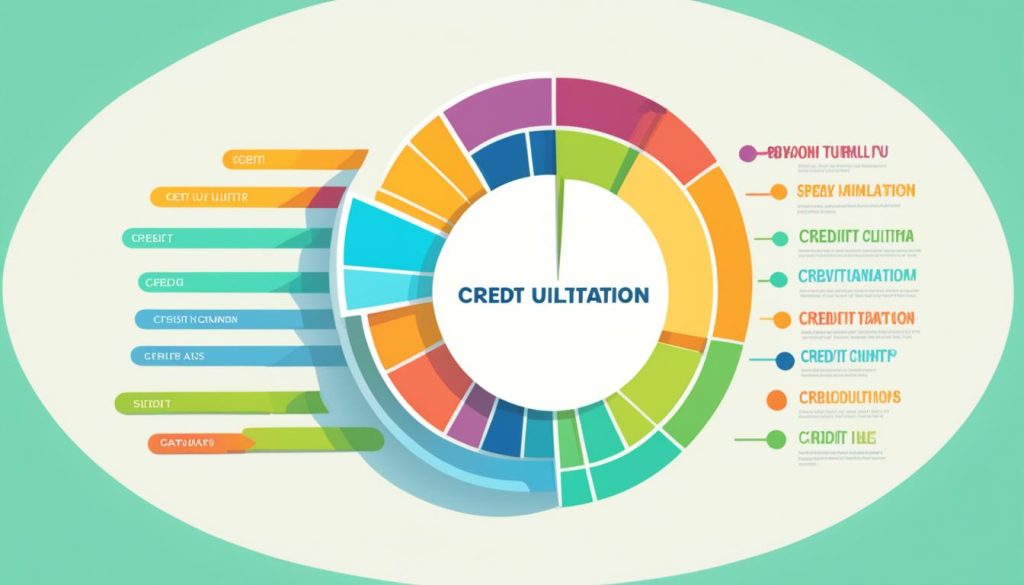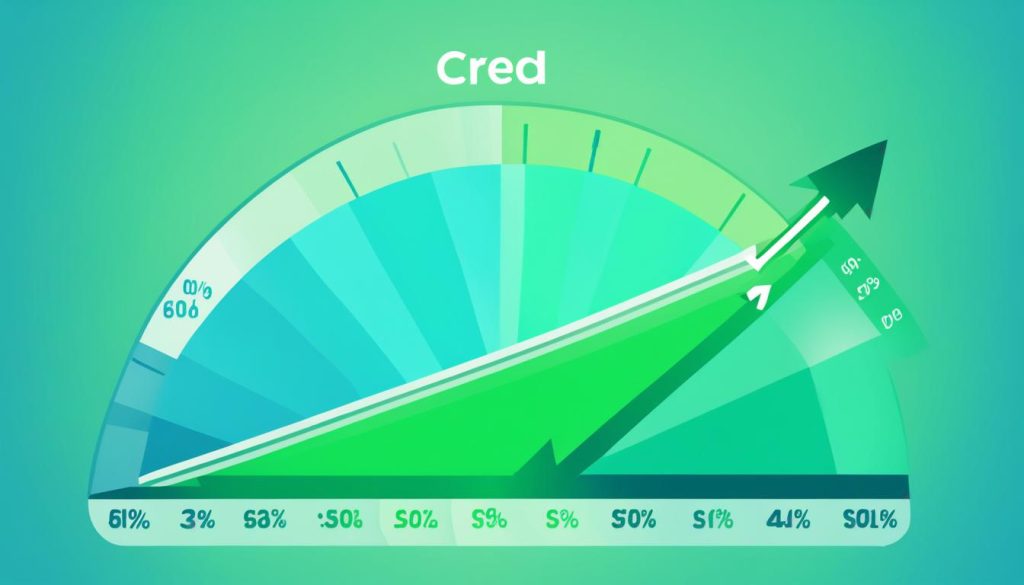Having a good credit score is key to getting a mortgage and getting the best interest rates. You can boost your credit score by knowing what affects it, like payment history, credit use, and credit history length. This article will give you tips and strategies to improve your credit and increase your mortgage approval chances.
Key Takeaways
- Understand the minimum credit score requirements for different mortgage types, including conventional, jumbo, FHA, VA, and USDA loans.
- Monitor your credit report and debt-to-income ratio to identify areas for improvement.
- Prioritize paying bills on time and reducing credit card balances to improve your credit score.
- Avoid opening new credit accounts and dispute any errors on your credit report.
- Consider becoming an authorized user on a credit card with a long, positive history.
Understand Mortgage Credit Score Requirements
Different mortgage types have different credit score needs. Conventional loans usually want a score of at least 6201. Jumbo loans might need a score of 700 or higher1. Government-backed loans like FHA, VA, and USDA are more lenient, with FHA loans available to borrowers with scores as low as 580 or 500 with a 10% down payment2. Knowing these score thresholds helps you see which loans you might qualify for and sets realistic expectations for applying for a mortgage.
Minimum Credit Scores for Different Loan Types
Here are the minimum credit score requirements for various mortgage types:1
- Conventional: 620
- Jumbo: 700
- FHA: 580 (or 500 with 10 percent down)
- VA: 620 (lenders may have their own requirements)
- USDA: 640
The average credit score for a borrower getting a mortgage is 738, as reported by Optimal Blue’s May 2024 Market Advantage report1. Also, the national average FICO score for mortgage applicants as of October 2023 is 717, down one point from July 20231.
Credit Report, Debt-to-Income Ratio, Credit Utilization
It’s important to check your credit report, debt-to-income ratio, and credit utilization regularly to find areas to improve before applying for a mortgage2. Knowing what affects your FICO score, like payment history, debt amount, credit history length, new credit inquiries, and credit mix, helps you focus on what to improve1.
Pay Bills on Time and Reduce Credit Card Balances
Importance of On-Time Payments
Payment history is the biggest factor in your credit score, making up 35% of your FICO score1. Always paying on time shows you’re responsible with money, even if your credit score is low2.
Strategies to Lower Credit Utilization
High debt and credit utilization can hurt your credit score2. Pay off high-interest debts first to improve your debt-to-income ratio and creditworthiness2. A bigger down payment can also help, showing you’re financially disciplined and lowering the lender’s risk2.
Avoid Opening New Accounts and Disputing Errors
Don’t open new credit accounts, as each inquiry can lower your credit score1. Check your credit report often and correct any mistakes to avoid score damage.
Consider Authorized User Status or Rapid Rescoring
Benefits of Being an Authorized User
Being an authorized user on a credit card with a good history can boost your score, adding the card’s history and limit to your credit profile2. This is especially helpful for those with limited or bad credit histories.
By following these tips, you can improve your credit and increase your chances of getting a good mortgage. Always get advice from qualified mortgage advisors or financial planners to make sure your credit and finances are ready for a home loan.
Understand Mortgage Credit Score Requirements
Your credit score is key when you want to get a mortgage. Lenders look at it to see if they should lend you money. They have certain credit score needs for different mortgage types.
Minimum Credit Scores for Different Loan Types
What credit score you need depends on the mortgage type. Conventional loans usually want a score of 620. Jumbo loans might ask for 700 or more3. FHA loans can go as low as 580, or 500 with a 10% down payment3. VA and USDA loans have their own score needs.
Remember, these are the lowest scores you can have. The average score for getting a home loan is 7383. So, try to get the highest score you can to get better loan terms.
| Loan Type | Minimum Credit Score |
|---|---|
| Conventional | 620 |
| Jumbo | 700+ |
| FHA | 580 (500 with 10% down) |
| VA | Varies |
| USDA | Varies |
Knowing the credit score needs for different mortgages helps you pick the right one for you. Aim for the highest score you can to boost your chances of getting approved and getting better loan terms3.
Credit Report, Debt-to-Income Ratio, Credit Utilization
Your credit report, debt-to-income ratio, and credit utilization are key when lenders check your mortgage application. Make sure to check your credit reports from the three big bureaus for errors and dispute them. Also, keep an eye on your credit utilization ratio, aiming for it to be under 30%4. A good debt-to-income ratio, which compares your debt payments to your income, can help you get your mortgage approved5.
Your credit utilization ratio is a big part of your credit score, making up 30% of it4. VantageScore also sees credit utilization as very important in scoring4. Try to keep your credit utilization below 30% on each card and all together for the best credit score4.
The debt-to-income ratio (DTI) is your total monthly debt divided by your monthly income. Lower ratios mean you’re doing well financially5. Lenders look at DTI to see if you can handle more debt5. Different lenders have different DTI standards, so it’s good to know these5.
| Debt-to-Income Ratio | Lender Evaluation |
|---|---|
| 35% or less | Favorable and manageable |
| 36% to 49% | Adequate with room for improvement |
| 50% or higher | Limited financial flexibility |
Your debt-to-credit ratio is part of your FICO® Score, making up 30% of it6. Credit scoring models look at your debt compared to your credit limits6. Experts suggest keeping your debt-to-credit ratio under 30% for a good credit score6.

High credit scores are linked to debt-to-credit ratios close to 0%. Higher ratios mean lower scores6. Your debt-to-credit ratio is key in your FICO® Score6. A high ratio can lead to higher interest rates or even loan denials6.
Lenders look at both your debt-to-credit and debt-to-income ratios when applying for credit6. A high debt-to-income ratio shows you might be over-leveraged and struggle with more payments6. Only your debt-to-credit ratio affects your credit score, not your income6.
“A Debt-to-Income (DTI) ratio of 43% is typically the highest ratio that a borrower can have and still get qualified for a mortgage.”5
Lenders usually want DTI ratios below 36% for mortgage approval5. The ideal is a ratio under 36%, with no more than 28% to 35% of that debt for your mortgage payment5. To lower your DTI, you can cut your debt or increase your income5.
Debt-to-income ratios are key in mortgage approval. They show if you can handle your debt and income well546.
Pay Bills on Time and Reduce Credit Card Balances
Having a good credit profile is key when you apply for a mortgage. One top way to boost your credit score is by always paying your bills on time7. This part of your credit score is a big deal, making up 35% of it7. Also, cutting down your credit card debt and keeping your credit use low can really help your score7.
Importance of On-Time Payments
Payment history is the biggest factor in your credit score7. By always paying on time, you show lenders you’re reliable and can pay back what you owe. This helps a lot when you’re applying for a mortgage, making you more likely to get a good deal.
Strategies to Lower Credit Utilization
Your credit utilization ratio is how much you’re using of your available credit. It’s a big part of your credit score789. Experts say to keep this ratio under 30% for good credit health89. To lower it, you can pay off your debt, ask for a higher credit limit, or be an authorized user on someone else’s card789.

“Maintaining a utilization rate around 10% is suggested for optimal credit score management.”7
By using these tips and keeping your credit use low, you can really boost your credit score. This will make getting a mortgage easier789.
Avoid Opening New Accounts and Disputing Errors
When you’re aiming for mortgage approval, watch what you do with your credit. Applying for new credit, like credit cards or loans, can lower your score because of hard inquiries10. These inquiries from credit applications can stay on your report for up to two years, affecting your score for a year10. So, it’s wise to avoid new credit applications before applying for a mortgage.
Also, if you find errors on your credit report, fix them fast. Wrong info can hurt your credit score and risk your mortgage approval10. A 2013 FTC study found about one in four people had errors that could change their credit score10. Correcting these errors helps make sure your credit history is accurate.
Keeping your credit utilization low is key11. Lenders like to see this ratio below 30% of your total credit1110. A ratio under 30% shows you’re good at managing debt, which helps your credit score and mortgage application.
For a successful mortgage application, keep your credit in top shape. Be careful with your credit and fix any mistakes quickly. This way, you’re more likely to get your mortgage approved1110.
Consider Authorized User Status or Rapid Rescoring
If you have a short credit history, becoming an authorized user on someone else’s credit card can boost your credit score. This adds their good payment history to your report12. Or, you can try a rapid rescoring service to quickly improve your credit. This service updates your credit score fast after you’ve paid down debt or fixed errors13.
Benefits of Being an Authorized User
Being an authorized user can greatly increase your credit score. The good credit history of the main cardholder is added to yours12. This is great for those with little credit history or rebuilding their credit. But, make sure the main cardholder has a solid credit history and pays on time, as it affects your credit score12.
Rapid rescoring is another way to quickly boost your credit score. It updates your credit report and score in days, not months13. Fixing errors or showing recent positive changes in your credit history can raise your credit score. This might help you get better mortgage terms13.
Choosing to be an authorized user or using rapid rescoring can help improve your credit score. These methods increase your chances of getting a mortgage approved1213. Remember, good credit habits like paying bills on time and keeping credit card balances low are key for a strong credit profile12.
Conclusion
Improving your credit score is key to buying a home. It affects your loan eligibility and the interest rate you get14. Knowing what affects your credit score, like your debt and how much you owe, helps you improve it. This can make getting a good mortgage loan more likely14.
To boost your credit score, pay bills on time and lower your credit card balances15. Avoid making new credit applications too often. Keeping your credit use below 30% is good for your credit score and getting a mortgage14. Keeping an eye on your credit management is important for a good credit profile during the home buying journey.
By acting on these tips, you can improve your credit score. This means you’re more likely to get a good mortgage loan. It makes buying a home smoother1514. Getting advice from financial experts can also help you manage your credit utilization and debt. This ensures a successful home buying experience.
FAQ
What is the minimum credit score required for different mortgage loan types?
The minimum credit score needed varies by loan type. Conventional loans usually want a score of 620 or more. Jumbo loans need a score of 700 or higher. FHA loans can accept scores as low as 580, or 500 with a 10% down payment. VA and USDA loans have their own score requirements. But, aiming for the highest score you can get is best, as the average score for buying a home is 738.
How do my credit report, debt-to-income ratio, and credit utilization impact my mortgage application?
Lenders look at your credit report, debt-to-income ratio, and credit utilization when reviewing your mortgage application. Check your credit reports from the three big bureaus for errors and dispute them. Keep your credit utilization below 30%. A good debt-to-income ratio, which compares your monthly debt to income, also helps your chances of getting approved.
Why is it important to make on-time payments and reduce credit card balances?
Making all your payments on time is key to boosting your credit score. It makes up 35% of your FICO score. Also, lowering your credit card balances and keeping your credit utilization ratio low can greatly improve your score.
What should I avoid when applying for a mortgage?
Don’t apply for new credit, like credit cards or loans, before your mortgage application. It can lower your score due to hard inquiries. Also, fix any errors on your credit report quickly. Wrong info can hurt your score.
How can I quickly improve my credit score?
If your credit history is short, becoming an authorized user on a credit card of someone with good credit can help. You’ll get their positive payment history on your report. Or, use a rapid rescoring service to update your score quickly after improving it, like paying down debt or fixing errors.
Source Links
- How To Improve Your Credit Score For A Mortgage | Bankrate
- Tips for Improving Your Chances of Mortgage Approval with a Low Credit Score – RCG Mortgage
- What Is A Debt-To-Income Ratio For A Mortgage? | Bankrate
- How Do Credit Utilization and Debt-to-Income-Ratios Affect My Credit Score? – NerdWallet
- Debt-to-Income (DTI) Ratio: What’s Good and How to Calculate It
- What Is a Debt-to-Credit Ratio and Why Is It Important? – Experian
- What Is a Credit Utilization Rate? – Experian
- What Is Credit Utilization Ratio? How to Calculate Yours – NerdWallet
- Credit Utilization Ratio: Definition, Calculation, and How To Improve
- How to Improve Your Credit Score Fast
- Articles
- How to Raise Your Credit Score Fast | 2024 Guide
- What Is a Rapid Rescore? – Experian
- What Is Debt to Credit Ratio and How to Calculate?
- What Is Credit Utilization Ratio?

